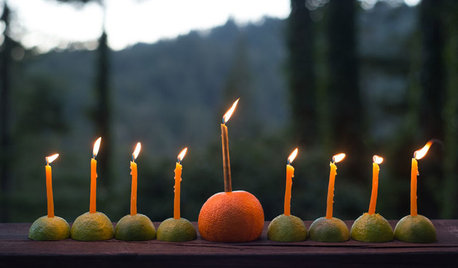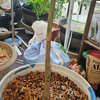'Heirloom' oranges or other citrus.
greyghost61
12 years ago
Related Stories

GARDENING GUIDESHow to Keep Your Citrus Trees Well Fed and Healthy
Ripe for some citrus fertilizer know-how? This mini guide will help your lemon, orange and grapefruit trees flourish
Full Story
YELLOWCitrus Hues Add Zest to Rooms
You almost don't need to clean when you wash your spaces with the refreshing colors of lemons, limes and oranges
Full Story
APARTMENTSHouzz Tour: Refreshing Citrus Twist in a London Home
Orange, yellow and green accents wake up a neutral palette in a new 1-bedroom unit
Full Story
GARDENING GUIDESSpring Citrus Care Reaps Months of Sweet Rewards
Learn how to tend citrus trees in spring and ways to preserve their delicious fruit
Full Story
COLORColor of the Week: 10 Tangy Ways with Citrus Green
Add some zest to your home with a little — or a lot of — lively lime
Full Story
HANUKKAHSimply Beautiful Hanukkah: Make an Easy Citrus Menorah
Fruit and candles create a fragrant Festival of Lights display that's a treat for the eyes
Full Story
GARDENING AND LANDSCAPINGCitrus 101: Start Your Own Backyard Orchard
This Earth Day Weekend, Add Some Green, Style and Deliciousness to Your Landscape
Full Story
KITCHEN DESIGN2012 Color: A Splash of Orange for Kitchen and Bath
Bring the energetic colors of citrus and sun to tub, counter, floor and more
Full Story
PRODUCT PICKSGuest Picks: Sprightly Spritzes of Orange
Raise your home’s energy levels for spring with decor in kicky shades of citrus
Full Story
DECORATING GUIDESPaint Color Ideas: 7 Bright Ways With Yellow and Orange
Go with the glow. These sample palettes and room examples show you how to work with two of the happiest hues around
Full StoryMore Discussions








johnmerr
greyghost61Original Author
Related Professionals
Brentwood Landscape Architects & Landscape Designers · Cary Landscape Architects & Landscape Designers · Deer Park Landscape Architects & Landscape Designers · Ilchester Landscape Architects & Landscape Designers · Montgomeryville Landscape Architects & Landscape Designers · Gaithersburg Landscape Contractors · Mahwah Landscape Contractors · McLean Landscape Contractors · Pahrump Landscape Contractors · Post Falls Landscape Contractors · Rochester Landscape Contractors · Tigard Landscape Contractors · Vancouver Landscape Contractors · Waldorf Landscape Contractors · Suisun City Landscape Contractorsrhizo_1 (North AL) zone 7
tantanman
rhizo_1 (North AL) zone 7
kumquat1
swede1234
hoosierquilt USDA 10A Sunset 23 Vista CA
plantman224
JoppaRich